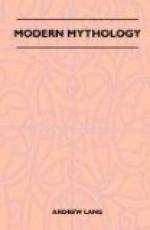Without pausing to consider the Tongan myth of the Origin of Death, we may go on to investigate the legends of the Aryan races. According to the Satapatha Brahmana, Death was made, like the gods and other creatures, by a being named Prajapati. Now of Prajapati, half was mortal, half was immortal. With his mortal half he feared Death, and concealed himself from Death in earth and water. Death said to the gods, ‘What hath become of him who created us?’ They answered, ’Fearing thee, hath he entered the earth.’ The gods and Prajapati now freed themselves from the dominion of Death by celebrating an enormous number of sacrifices. Death was chagrined by their escape from the ’nets and clubs’ which he carries in the Aitareya Brahmana. ’As you have escaped me, so will men also escape,’ he grumbled. The gods appeased him by the promise that, in the body, no man henceforth for ever should evade Death. ’Every one who is to become immortal shall do so by first parting with his body.’
Yama
Among the Aryans of India, as we have already seen, Death has a protomartyr, Tama, ’the first of men who reached the river, spying out a path for many.’ In spying the path Yama corresponds to Tangaro the Fool, in the myth of the Solomon Islands. But Yama is not regarded as a maleficent being, like Tangaro. The Rig Veda (x. 14) speaks of him as ’King Yama, who departed to the mighty streams and sought out a road for many;’ and again, the Atharva Veda names him ’the first of men who died, and the first who departed to the celestial world.’




